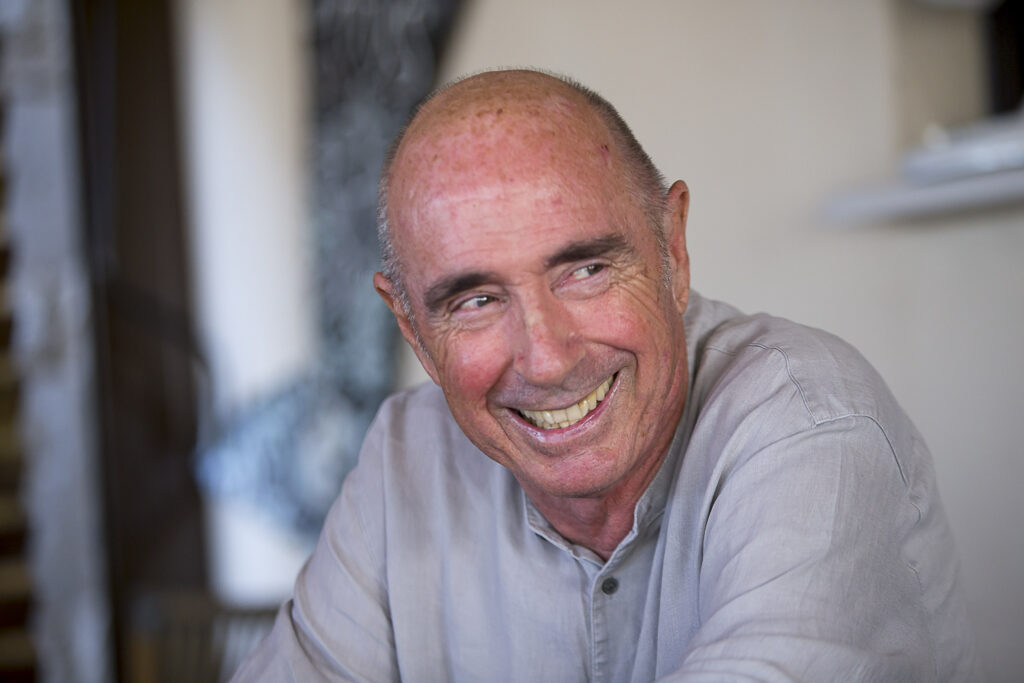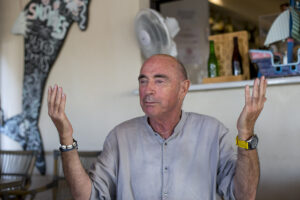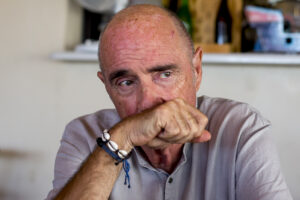27.09.2019 - 07:41
|
Actualització: 27.09.2019 - 09:41
Lluís Llach composed “L’Estaca” in 1968 and the song soon became an hymn of the anti-fascist resistance to Francisco Franco’s dictatorship. The song is a call for unity of action to achieve freedom, has been translated into several languages and versions of the song have been used by the Polish trade union Solidarnosc during the 1980s or in the Tunisian Revolution of 2011, to give only two examples. In Catalonia, “L’Estaca” is one of the most well-known freedom songs and has never gone outdated. It is fully valid today, as we are living through difficult days, with political prisoners and continuous threats from Spain to bring back direct rule to Catalonia.
Words are about to turn into action. Llach is unambiguous and his message comes across crystal clear: the power of confrontation is in the streets. The people’s empowerment is our truest strength. A snap election or softly-softly tactics will not hit the mark. In Catalonia, the Constituent Debate he leads is taking shape as part of this empowerment. The name no longer rings hollow. It is a potentially far-reaching political project whereby thousands of people will have built a road map to a better country by spring 2020.
—A few months ago you said that it might be too late, if we waited to have a verdict [in the case of the jailed Catalan leaders] before reacting. How come we haven’t staged a reaction?
—There are several factors at play and having had our leadership decapitated is not a minor one. A second factor is the blackmail against the prisoners and exiles. On this point many have remained very prudent so as not to hurt anyone and it’s only ever been mentioned recently. The third factor is that people are not aware of their own power. They believe that they’ve got this far because they’ve been led, but that’s not true. They’ve got where they are all by themselves. When I was an MP, I always used to say that “we are here because you got here first”.
—Do you still see the verdict as an opportunity?
—Yes, the verdict remains our greatest opportunity, given the strategic mess [within the pro-independence camp]. A guilty verdict will mean the assassination of the Spanish constitution by those who defend it. What we are currently seeing is a coup d’état staged by a power that is relatively unknown to us —the judiciary— and they are being very thorough about it. Obviously, they’ve been handpicking those who sit at the very top of the judiciary for years. PM Aznar went further than his predecessors, but they did their bit, too. They only chose sympathetic names. It’s really tough, especially on the Catalan public, who felt let down following the 2017 independence bid because —as president Puigdemont has rightly pointed out— many mistakes were made on October 1, 3, 10 and 27. Many, indeed. That’s had a massive impact. You can never claim this will be our last chance, but a guilty verdict presents a strategic opportunity for us. They are getting ready. I don’t know what our response must be, but I do know what it shouldn’t be.
—You have reiterated that a snap election would be unfit as a response.
—Absolutely. If anyone seriously suggested holding an election, I would understand that as an attempt to demobilise the people: “stay home, you’ll get your say at the polls!”. No way, Jose.
—This week someone also floated the idea of forming a broad coalition government to respond to the verdict.
—I could understand that if the purpose was to stand up to Madrid. But a multi-party coalition as a way to deter the Catalan people is not something I’d go along with.
—What’s on your mind?
—We’ll have to see what proposals are aimed at actively confronting the state in a peaceful, democratic manner and which are a means to keep the people home. Confrontation is the only way to broaden our support base. I can’t accept the idea that confrontation is detrimental to support for independence. To me it is what drives its growth. Snap elections and a broad coalition government sound like ways of demobilising the people, no matter who suggests it. To me they aim to channel the people’s outrage and keep them off the streets.
—How do you view institutional confrontation?
—It must be done, but it’ll be very feeble. The Spanish state’s powers are immense. Having said that, we shouldn’t play down the role of institutional confrontation. President Quim Torra carries that banner by himself. It’s a good thing when the president of Catalonia preserves the dignity of confrontation in the face of such a brutal state.
—Following the 2017 referendum on independence perhaps we made a mistake by relying too much on the institutions?
—The leaders who took a chance were widely trusted. Perhaps people would have been better prepared, if we hadn’t had that leadership. But I felt that way, too. As an MP, I was persuaded that we were going all the way. We know how it all ended. Considering our experiences and what we’ve learnt, it is clear that the power of confrontation lies in the streets, for now. My experience of the last eighteen months working on the Constituent Debate is that people are tired, but they are willing. All of them. If we aren’t tapping into that, it is because we don’t want to or we can’t. When you travel around Catalonia, you realise people are willing and when you leave a place, they are standing and ready.
—Surely they have to realise they have that power, even without a leadership?
—And who’s saying they don’t? They are well aware of it and some are working hard at it. But I’m not privy to that because I’m totally focused on the constituent process.
—Shouldn’t we expect a joint strategy?
—There’s a theory I don’t buy: you drum up support through persuasion. Confrontation also leads to persuasion because people in Catalonia, regardless of their political views, can see the ongoing democratic fraud and this might prompt them to think that a different country, a different society are possible.
—What do you think of the trial [of the jailed independence leaders]?
—Well, while I would actually call myself a friend of some of the defence lawyers, I think the best possible closing remarks in court would have been to walk out. To denounce the justice system before Europe and Spain would have had a great impact. Now, that’s just my opinion as an outsider. I don’t know what I would have done, if I’d been in their shoes.
—You talk about building. You seem very pleased with the constituent debate project.
—We’re building a very exciting thing, something important, I’d dare say. When I accepted the job, I had some doubts. But it grew on me when I realised that we were able to build something important. I get the feeling I was picked because I could rally the people around me, but surprisingly enough, I’m the one that’s got all hyped up. We’re at a very nice stage: the two-month training session phase. This project requires empowered people who wish to change this nation and want their voice to be heard.
—You always say that us Catalans are too proud of ourselves. But now that you’ve travelled across the nation, would you say Catalonia is more modern and progressive than it seems?
—It is more modern. Many believe that, seeing the world as it is, the old system doesn’t work anymore. I don’t know why that is. Perhaps it’s due to the recession we’re leaving behind. You no longer need to be militantly anti-system: the system is crumbling down as it is and many people will suffer in the process. The system has always managed to re-invent itself, so I don’t know how it will end. The system is self-destructing. It is very tough, very resilient, and it’s used to going to whatever lengths to survive. So it won’t quit without a struggle. But I feel that the paradigm shift is underway already. We’re witnessing its downfall. Now we need to see how we fit in.
—It’s a very complex time.
—Any time we raise our head and say “Hi! We’re here!”, things get complicated. It always triggers something. Just look at our history. Perhaps we should ask the stars first in order to choose an auspicious day (he laughs). But now we’re seeing such far-reaching changes to the economy’s structure that it might actually turn into an opportunity. During our training session in Tortosa the other day, a fascinating issue came up: energy will no longer be a seizable commodity. That’s a whole new way of looking at stuff. The sky above your town belongs to your town. The air and the sun belong to all of us.
—Yesterday you offered another workshop in Girona, on security and international relations. How many training sessions are still left?
—We still need to deal with another five items: territorial organisation (in Sabadell), rights (in Tarragona), the economic system (in Lleida), political organisation (in Manresa) and the constituent elements, which will be our last session, to be held in Barcelona city. In these training workshops the speakers make brilliant presentations that participants build upon with questions, proposals and controversial contributions. Truth be told, the people are of a very high calibre. You can sign up online or in person.
—A new phase will kick off once the training sessions are over and it won’t be just face-to-face. Will everyone be welcome to join in?
—The new phase will begin in November and you’ll be able to take part in three different ways. Firstly, through the associations that have mobilised the county-level groups. They have completed all the lead-up work and are the ones calling the shots. Here people will get a chance to get involved in specific issues or on a general level. To give you an example, a local society in my hometown, Verges, will be allowed to throw a few tables together and encourage participation on a general level so that people can have a say. At the same time, a Bar association —lawyers have been very active in the debate— might hold a session aimed only at people wanting to discuss legal issues. There will be another way to get involved across the board, for anyone who doesn’t want to feel constrained. They’ll be able to do it from home, in groups of 3-4 people: a family, a bunch of friends and so on. This phase will end between March and April and then the Forum will kick off.
—You will need plenty of IT resources for that.
—Yes, we’ll have a powerful IT system that will facilitate transparency and traceability. That will allow us to sort the replies using computers.
—They won’t allow it.
—We’ll protect it.
—So, if there’s no constitution in the end, what will we have?
—We do not want to draft a constitution and it’s not for us to do that. By empowering the people, we will build a very explicit roadmap showing what most of us in Catalonia would like. This map will be made available to all political groups who honestly seek a transformation, including those who support independence. I don’t know if Catalonia is ready to stage a nation-wide stoppage that grinds everything to a halt, but I do know we are ready for this.
—The way you are developing this project, from the bottom up and starting with eighty questions, you might end up producing a very significant piece of work, but the constituent debate might also become a movement that is able to rally very many people who’ve chosen to get involved.
—It is very important to say to Madrid, now that they think they’ve got the upper hand: “hey, you! We’re conducting a constituent process”. The message that we are thinking about and deciding our own future should also be sent to Europe. It is an extremely powerful message. You were right when you said that it’s got the potential to rally many people. Anyone familiar with this sort of thing will tell you that you can’t reach 2 per cent of the population, not even with the government’s backing or massive advertising campaigns. Well, if we succeed we might surpass that figure and that would mean a lot.
—I am impressed by your persistence and coherence.
—That doesn’t actually matter, it’s all about being at peace with yourself. People apply a heroic veneer to coherence when, in fact, it is a form of egotism. I did not have an easy start: I was born into a very conservative family, suddenly discovered a whole new world when I moved to Barcelona city, I was gay and opposed the Franco regime. First thanks to Setze Jutges [a collective of Catalan songwriters], later thanks to the workers’ struggle. People used to think I was doing them a favour when they were actually doing it to me! I recall the people who used to work at Motor Ibérica very well. They educated me. I was a bourgeois kid from Empordà. Then I got there and met people who were going hungry, fighting for their rights. There’s no heroism or merit in that. I said what I wanted to say because people allowed me to. Even when other singers had to quit, I was free because people would keep coming to see me.





